Barbarism and its Discontents
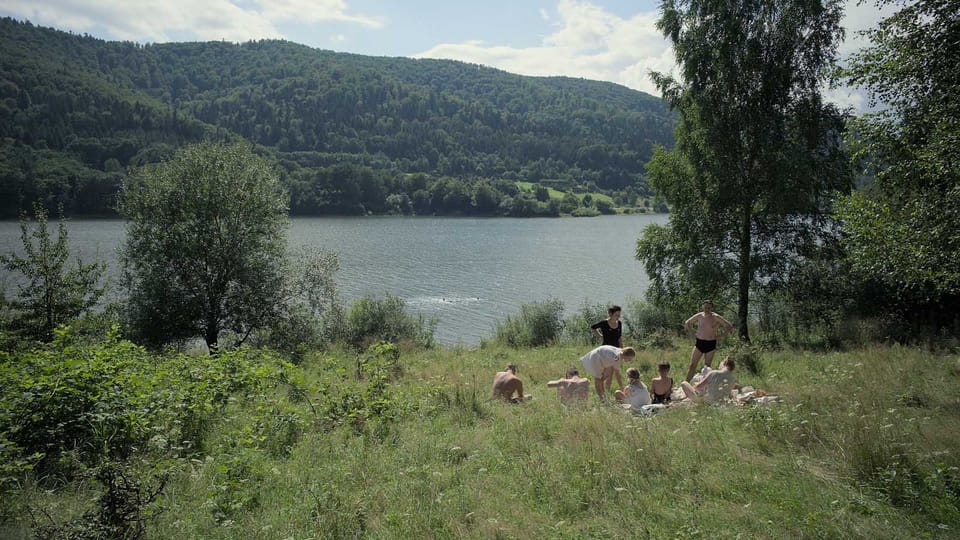
Greetings, friends. This one's more of a downer than usual, and long even by my standards, but it's one I felt I had to get out. I saw No Other Land on March 8, and in that time the film's subject matter has been the basis of headline-grabbing international news that is still ongoing. I also had a lot more I wanted to say about The Zone of Interest besides my initial brief thoughts a year ago, and so this felt like the appropriate time to get them down. This gave me occasion to check out Northwest Passage, an old Hollywood curio that had been on my watch list for actual decades and is less of a heavy lift than the other two. I hope you find it interesting, engaging, motivating. The next installment will be a lighter affair, I promise.
Introduction: Fascist Fascinations
"When the general atmosphere is bad, language must suffer," George Orwell wrote in Politics and the English Language. "I should expect to find... that the German, Russian and Italian languages have all deteriorated in the last ten or fifteen years, as a result of dictatorship." The viewer of The Zone of Interest, or even just of its title, need not surmise. A legal term referring to the rights protected by a given statute, it was used by the Nazis to denote the land surrounding the Auschwitz concentration camp complex where its administrators lived. The phrase is meaningless to an outsider, and corrupt to those with the knowledge it obfuscates: Auschwitz was was in every sense a dead zone, where legal protections and their beneficiaries ceased to exist.
To say The Zone of Interest is an unorthodox take on Auschwitz and the Holocaust is to be almost as euphemistic as its title. Its radical approach strips it of sincere but canned sentiment that threatens to dull the subject's shock to the conscience. One its most important acts is to highlight how rather than a singular evil, the Third Reich was an imperial government and as such had commonalities with other such projects. In a voiceover Fritz Bracht, the Nazi's regional leader of Silesia who history would go on to christen the Beast of Auschwitz, writes in a letter to Martin Bormann that commandant Rudolf Höss is "a model settler farmer and an exemplary German pioneer of the East." The implications of that line ripple out through time and space, from colonial America to occupied Palestine.
The following movies about these subjects will not tell us how they came to be, much less how they can be changed. That is beyond their scope, especially for the works of fiction. They can show us, however, how these things can be shown or not shown; how the idea of who is human and worthy of consideration and dignity can be expanded; and how doing so is a moral imperative.
I. American Carnage

Northwest Passage
(dir. King Vidor, 1940)
If those who don't know their history are doomed to repeat it, then those who ought to know better delight in repackaging it. The majority of us learned over time, in some cases very recently, that the reality of American history is more complicated than what we tell schoolchildren, that independence was not extended to the continent's indigenous population and the chattel slaves imported from Africa. Such a contradiction is intolerable to some, and after a decade of halting and fragile attempts at reckoning with that history in pursuit of the proverbial more perfect union, it has metastasized into a vengeful movement, now in power, to undo decades of progress and erase its champions from official history. It seeks to take us back in time, not realizing that it too is a product of modernity. The past was present once, and just as mystifying.
Like America itself, Northwest Passage is a contradiction. It's a 1940 King Vidor adaptation of a novel by Kenneth Roberts, but it only adapts the novel's first book; the titular passage, a seafaring route from the Atlantic Ocean to Japan through North America, is only mentioned in passing, to be explored in a sequel that was never made. The movie is commonly billed as a Western, but it takes place in Quebec, and its French and Indian War narrative takes place a century before westward expansion. An early scene ends with the protagonist, an artist, expressing a noble desire to paint Indians. "I could paint them as they really are. Nobody's ever done it before." He says this only minutes after a scene where he helped rouse a mortifying caricature of a drunken Indian by singing "Drink to Me Only With Thine Eyes." It's a telling contrast endemic to a movie that rouses and repulses in equal measure.
The painter is Langdown Towne (Robert Young), a young artist and sometime mapmaker of 1759 Portsmouth, New Hampshire, who first gets himself kicked out of Harvard and then skips town with local woodsman and belligerent "Hunk" Marriner (Walter Brennan) after insulting the colonial leadership. A stop in a remote tavern results in an introduction to Major Robert Rogers (Spencer Tracy), the the true-life leader of Rogers' Rangers into French Canadian territory, who ropes them into his current campaign, led by Stockbridge and Mohawk Indian scouts to the northward town of St. Francis to halt attacks by its French-allied Abenakis tribe against British and colonial interests.
As an adventure film it is a success. The setting calls for a vast wilderness, and we get that with William V. Skall and Sidney Wagner's Oscar-nominated Technicolor cinematography, filmed on location around Payette Lake in (full disclosure) my hometown of McCall, Idaho.[1] Actors and scores of extras wade through marshlands, cross a river by building a human chain, and hoist their whaleboats up a hillside. These sequences then and now are the reason to watch the movie. They capture the Sisyphean task of film production and how it is both not real and more real than what is being portrayed. During the filming of the boat hoist sequence one extra, a local ex-lumberjack, was massaging his muscles when Vidor quipped, "Rogers and his men actually did all this, you know, and thought nothing of it." To which the extra replied, "Yes, but they only had to do it once."
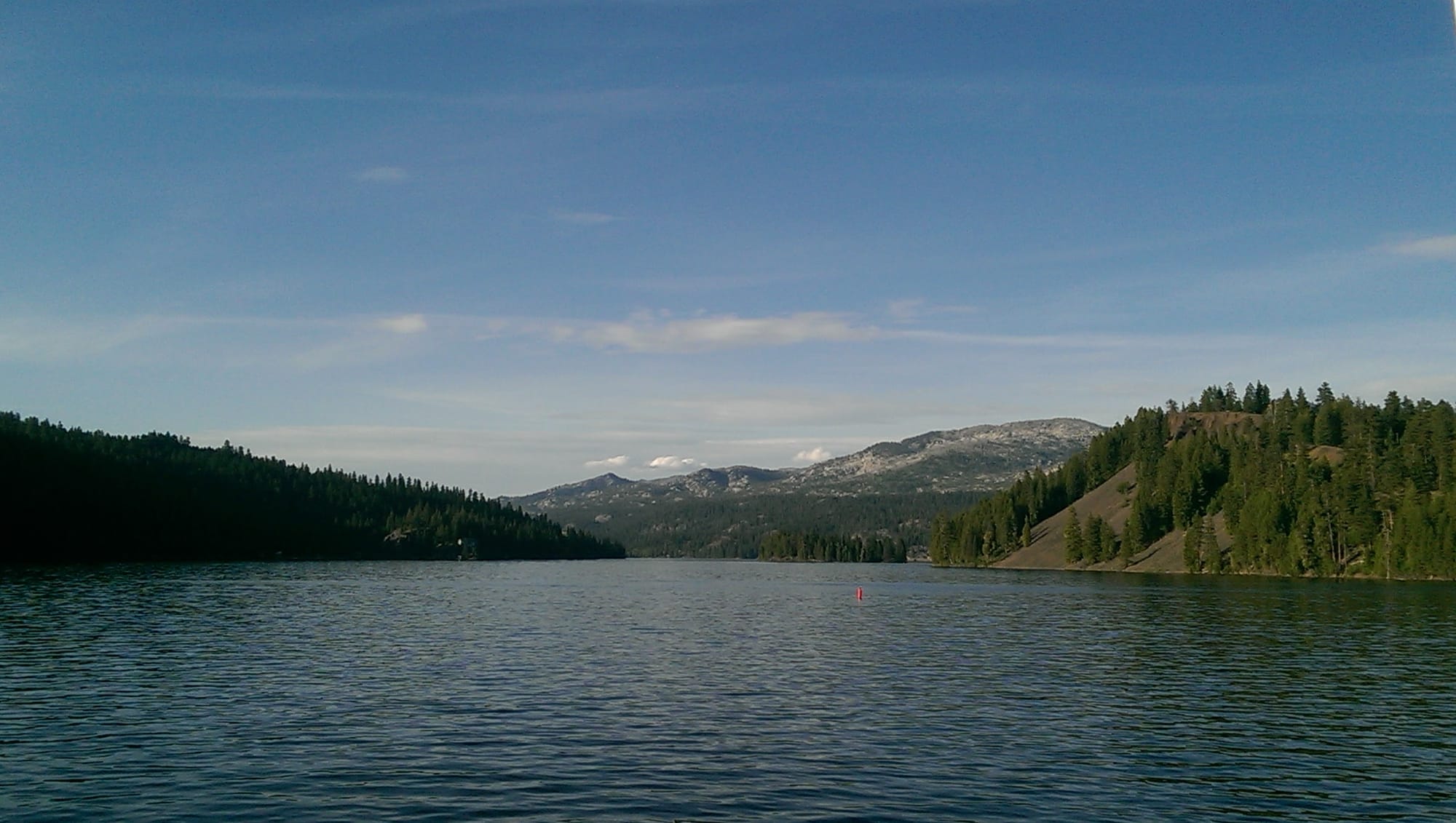
About the best thing that can be said of Northwest Passage's portrayal of Native Americans is that it does not treat them as a monolith. A major development involves Rogers dismissing the Mohawks who are loyal to Sir William Johnson. The movie's source novel is a fairly exhaustive treatment of this historical episode, and so the nods toward native politics and alliances are welcome. It is not nearly enough to compensate for the unsettling attack on St. Francis.
The raid on the Adenake village is the movie's centerpiece, the point where the clash of its advanced craftsmanship and its stunted moral sensibility create the greatest dissonance. Even more than the previous sequences, the scale beggars belief and financial discipline: hundreds of extras, brought in from seven native tribes, scramble and fight amid an entire town of 125 wooden buildings across ten acres set ablaze and slowly burned down. The direction has its share of grace notes too: no less than Martin Scorsese used one of its trick shots, a firearm smoothly gliding atop a dolly, in Taxi Driver, as Travis Bickle purchases a handgun and we see through his eyes as he scans the street below he seeks to cleanse.
The homage is appropriate, as the sequence is an explicitly exterminationist attack. Striking when the town is still asleep after a night of revelry, Rogers sets his men up at every possible exit, ambushing and gunning down the bewildered Adenake by the dozens with every escape route. The movie attempts to justify this, describing the Adenake's savagery and in the village showing poles displaying dozens of scalps. This is not nearly as vivid as the sacking of St. Francis, however, staged and given disturbing verisimilitude as it is by the rustic location photography. Yet amid this remains the unspoken assumption that mutilating an individual is barbarous, but destroying a population is civilized.
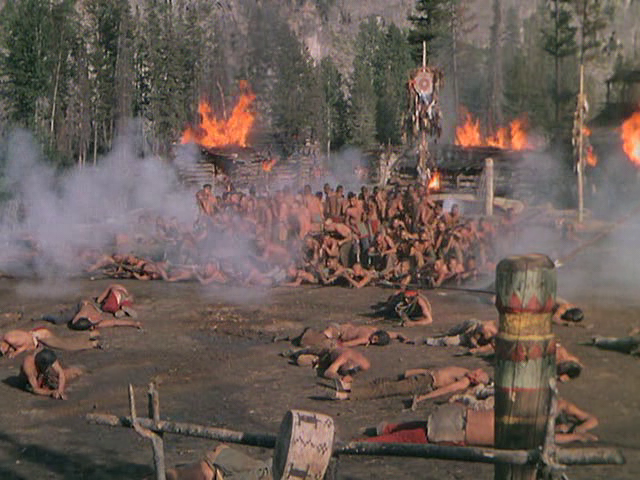
The only dissenting voice is a young white girl who was raised among the Adenake and curses Rogers as a "white devil." She is treated as an absurdity, but it is noteworthy all the same that she is allowed to speak the unspeakable. It gives the aftermath a hint of ambivalence, even as it takes a morbid turn. After Rogers tells his men that at St. Francis the French will find "nothing but roast Indians" to eat,[2] the Rangers slowly begin to starve. They succumb to delirium, one of them so far gone as to gnaw on an Indian's head, another chasing his hallucinations away. All told this is standard pioneer survival fare, but in the context of the raid and the girl's curse it can't but feel karmic.
It doesn't last. The British arrive at the rendezvous point, and with his duty fulfilled Towne returns home to marry his sweetheart and take up painting for real. Rogers at last announces his intention to find the fabled Northwest Passage, and tellingly teases the America his men will see by the various tribes they will encounter:
Why you Rangers haven't seen any Indians yet. You're going to see the Plains Indians, your going to see the red men of the Shining Mountains, and those men along the mighty river Oregon, red men white men have never seen before, because we're going to end up by the great western ocean itself. You're going to find a way across this continent: a Northwest Passage.
The indigenous are less people than place, part of the land itself, to be conquered. It's a disturbing notion, though not out of place. Northwest Passage isn't special in that regard, or most others, which makes it representative of American popular attitudes in 1940. The theater director Peter Brook once led a discussion about how much more difficult it is to connect as actor and audience to the deaths of people in the distant past than in recent memory. "When's a corpse a historical corpse?" A hundred-eighty years ago, now two hundred-forty, feels distant indeed for a young nation, and so it takes some moral imagination to realize the grotesquery turning mass murder into mass entertainment. Brook's group was discussing the dead of Agincourt in Henry V versus the dead of Auschwitz in The Investigation. As it happens the first of the Auschwitz concentration camps opened in 1940, and would go on to raise very different questions of cinematic memory.
II. Eastern Promises
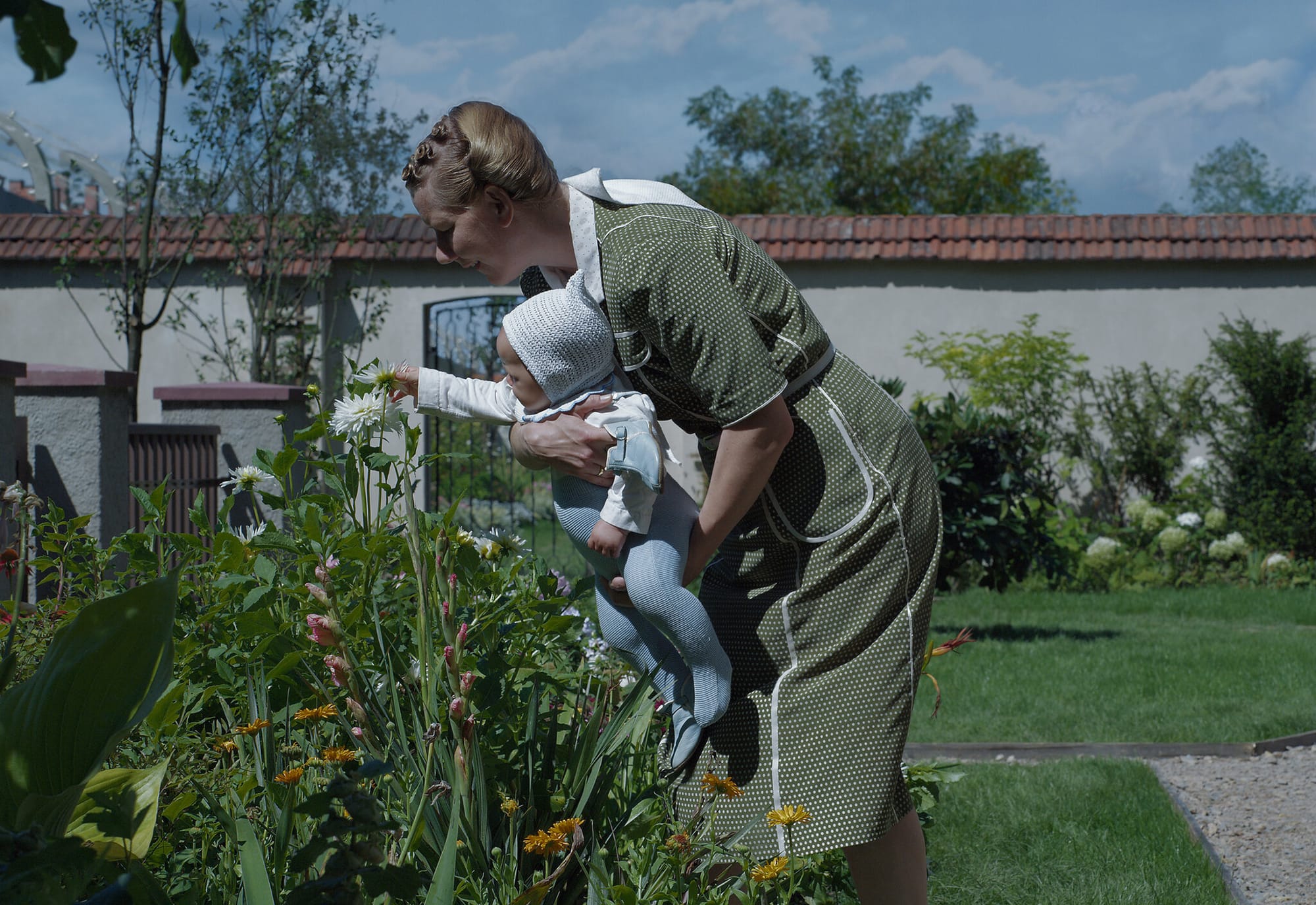
The Zone of Interest
(dir. Jonathan Glazer, 2023)
The Nazis had no Westerns, though not for lack of trying. While several films were produced to demonize the Slavs, Poles, Serbs, Russians, and especially Jews they sought to replace in eastern Europe, the regime was destroyed before they could make retrospective triumphalist propaganda in the American Western mold. Instead their cartoonish evil made them closer to Western villains, corrupt sheriffs or brutish gangs.[3] It also allowed their surviving victims to tell their own stories. Holocaust narratives flourished in the decades following, especially after 1993's Schindler's List. By 2023 the Shoah had become one of the most cinematically re-enacted historical events, which raises the question with every new one, of why. What is there new to say about an episode whose staggering inhumanity is agreed on by everyone who isn't willfully denying and obfuscating?
Jonathan Glazer's answer in The Zone of Interest is to turn the focus on the Holocaust deniers, who have existed as long as the Holocaust itself. It is not about denial after the fact, but in the moment of its execution, at every step, and the psychopathic levels of cognitive dissonance it requires. But more than just illustrating the mindset of a specific set of historical actors, Glazer illuminates the way denialism is required for any kind of atrocity, which even remembrance falls short of rectifying.
Obscurantism is baked into the story of Rudolf Höss (Christian Friedland) and his wife Hedwig (Sandra Hüller), living a prosaic life just outside Auschwitz's walls. Their children play, the women gossip, the dog gets into the food when no one is watching. Rudolf earns a promotion that will relocate the family, which doesn't sit at all well with Hedwig, who has the life she's always wanted and does not want to give it up. The scenes would be of the most quotidien quality but for the backdrop of concrete walls, barbed wire, billowing smokestacks, and constant eruptions of distant gunfire and screaming on the nightmarish soundtrack, which go unacknowledged.
'The banality of evil' gets brought up in nearly every discussion of The Zone of Interest, but that phrase was meant to describe functionaries who carried out the Nazis' extermination at a remove and were too incurious to know what they were doing. Höss oversees everything, and so he has to resort to euphemism and depraved pretending. He is helped by the industrial scale of the crime: once efficiency becomes a priority, genocide becomes merely an engineering problem. Above all, it is a job. Where the cognitive dissonance of a film like Northwest Passage went unrecognized by its creators, The Zone of Interest is ruthlessly directed to heighten the contradictions in how the family sees themselves: model settlers.
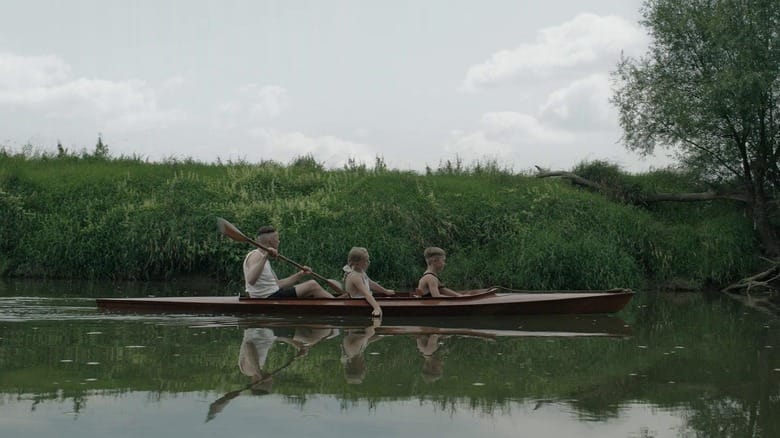
The movie is not a Western, but it contains flashes of similar imagery: verdant hills, horseback riding, canoing and fishing. The characters express the same aspirations of taming the land and its inhabitants. "This was a field three years ago," Hedwig tells her mother. She later assures her husband that "after the war when everything is over, we'll farm. Like we said."[4] One can even see echoes of American 'Cowboys and Indians' in the scenes of a toddler playing with toy soldiers, and the eldest son locking one of his brothers in the greenhouse and making hissing-gas noises. A society built on murder and plunder corrupts even the innocuous parts of everyday life.
That soul-sickness briefly catches up to Rudolf for but a moment, wretching at intrusive thoughts of what he has and will oversee: piles of shoes and luggage, countless photos of prisoners, preserved and displayed in Auschwitz as it is today, a museum and memorial for the dead. We see the staff vacuuming and sweeping the facilities, their cleaning routine as impersonal as the housekeeping of the Höss family home, and filmed at the same clinical remove. Memorializing too, is a job.
It's an unnervingly ambivalent comparison, one which suggests remembrance of crimes against humanity are not sufficient to compensate for them. But then, what could? The only solution is prevention—not for nothing is the only moral and aesthetic respite a sequence in which a local girl who leaves apples out for the camp's laborers plays a piece of prisoner music. The girl was a real person, Aleksandra Kołodziejczyk, to whom Jonathan Glazer dedicated his Best International Feature Oscar at the end of his acceptance speech. The dedication was largely forgotten, as controversy erupted around what he had said before it, a denunciation of Israel's war in Gaza, a part of a different but closely related settler campaign.
III. The Unsettlers

No Other Land
(dir. Rachel Szor, Hamdan Ballal, Yuval Abraham, and Basel Adra, 2024)
During and after World War II Jewish in-migration into British-occupied Palestine, already under way for decades, accelerated. With support from the ascendent United States and the war-wary United Nations, the state of Israel was established on May 15, 1948. A triumph for Zionists seeking a Jewish homeland, though by no means all Jews, the date is commemorated by Palestinians as the Nakba, the Catastrophe, for the expulsion of several hundreds of thousands of them from their homes it represents, and the beginning of a land grab that has advanced through the decades, depriving Palestinians of legal protections, statehood, and basic utilities.
In film this resulted in a lopsided state of production. Israel established a film industry early on, producing a body of work large and varied enough to hold even dissenting voices. More often, especially in the wake of the nation's founding, it reinforced a heroic national mythology that cast Palestinian terrorists as a villainous foil. The portrayal was not entirely one-note, not as often as Hollywood portrayals were, but nuances tended to boil down to the "good Arabs" who aid and support Israel against the "bad Arabs," inevitably terrorists who only want "to steal and kill." It's a construction that echoes the portrayal of American Indians, in Northwest Passage and elsewhere, who may ally themselves with the adventurous pioneers but are by and large savages raiding and destroying villages.
The Palestinians by contrast had neither the infrastructure nor the resources to sustain a film industry. Post-Nakba film production only began to take off with the support of the 1960s Palestinian revolutionary movement, which produced almost exclusively documentaries. Narrative fiction films began to appear in the 1980s, and they achieved greater international reach. The films are almost by definition about the occupation, as one could imagine Jewish cinema would be if history had stalled at the Warsaw Ghetto.
All of this is to say that in the context of Palestine, there is not much necessarily new about No Other Land. Yet the vicious attack by Hamas on October 7, 2023 and Israel's disproportionately brutal war in Gaza has heightened tensions and interest, and so No Other Land released in both the most receptive and most hostile environment possible. The polarized attitudes toward the film and Palestinian independece can make the one feel like a stand-in for the other, with the film's actual contents being secondary. But make no mistake: No Other Land is important as documentary in the legalistic sense, as a record, but also as an experience. It is an exhausting and enraging to watch—if you are allowed to watch, and if you allow it to affect you.
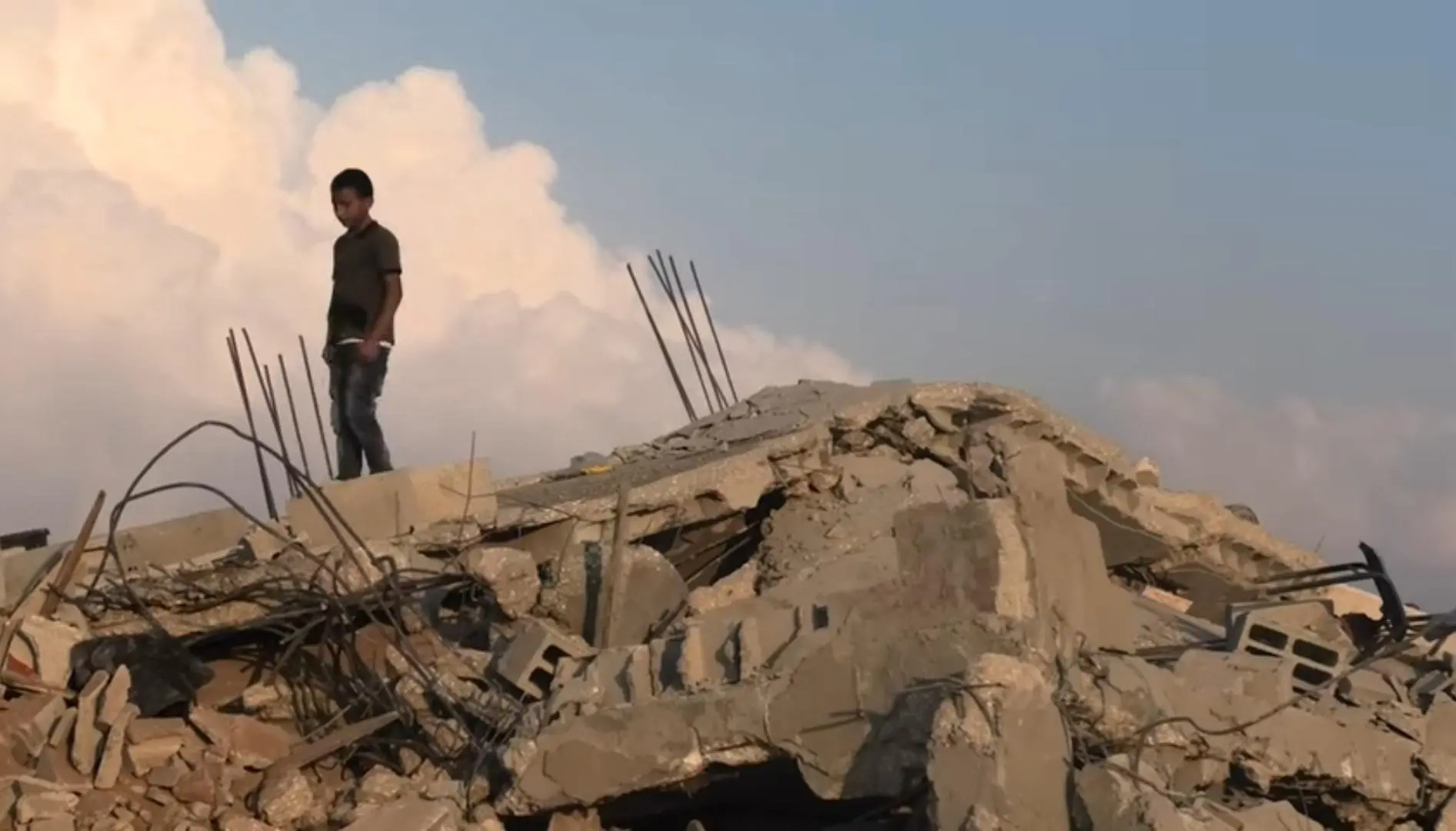
The doc is not just 'about Palestine,' but about a specific community, the Masafer Yatta region within the West Bank. In 1980 it was declared by the Israel Defense Force to be a "firing zone" to be used for military training, a pretext for restricting Arab expansion. Eviction orders came down in 1999, and residents sued to challenge those orders a year later. The bulk of No Other Land was filmed between 2019 and 2023, during which Israel's Supreme Court ruled against the residents, but its story begins in the early 2000s when resident Basel Adra, still a child, began filming protests and confrontations, including his father's arguments with settlers and IDF soldiers. As Basel and his people attempt in the present-day to get the world to pay attention, he is joined by Israeli journalist Yuval Abraham, who along with Rachel Szor and Hamdan Ballal serve as co-directors.
The demolition of Masafer Yatta was slow-moving by design, and the old clips help to telescope that process into a dense 90 minutes. True to that history this isn't a story with a lot of twists and grand flourishes, but a steady grind, punctuated by occasional bursts of brutality, with temporary relief coming every night when the soldiers go home—and sometimes not even then. We meet and get to know several members of this community, including Basel's father, who runs a single-pump gas station. We become all too acquainted with the bands of Israeli settlers, shirtless and masked and running riot with impunity as they attack villagers and destroy their property, and an IDF commander leading the demolitions who is largely irate that the locals won't just get out of the way and let him do his job. We also see the alliance between Basel and Yuval, and the inherent tensions in it. Yuval is earnest and puts himself on the line for his vulnerable Palestinian comrades, but he also brings with him a naivete that the right post or article will save the day. Basel is rightly skeptical of how much good publicity and awareness-raising even the film we are watching will accomplish, given how long Palestinian subjugation has gone on.
Basel comes by his weariness honestly, but the doc may well reach fence-sitters for how it changes the conflict from a distant news story to an offense happening before their eyes. One can think intellectually that sectarian violence is sad, but it's hard not to feel sick and enraged as Harun Abu Aran tries to keep a generator from being taken away, is shot in the neck by IDF soldiers, then lives in agonizing pain as a quadriplegic cared for by his mother in a cave for two years before succumbing to his wounds. Once you see the people of Masafar Yatta, the West Bank, Palestine, as actual people, you cannot but consider what happens to them an obscenity.[5]
If the discourse around the film's controversies have eclipsed the film itself, it is because the people stirring them up have refused to grant that humanity to its subjects. They do this rhetorically, as when Germany's minister of culture applauded its success at the 2024 Berlin Film Festival, but only, she clarified, for "the Jewish-Israeli journalist and filmmaker Yuval Abraham," and not Basel Adra. They do it silently, by distributors whose refusal to even consider distributing it in the United States is cowardly at best and bigoted at worst.
Increasingly the dehumanization has taken more direct and aggressive forms. In the month since winning the Academy Award for Best Documentary Feature, the mayor of Miami Beach, Florida threatened to evict and defund a theater for showing No Other Land. Only days ago co-director Hamdan Ballal was beaten by settlers and then taken by the IDF and held in freezing conditions overnight, before being released and taken to a hospital; in response the Academy of Motion Picture Arts and Sciences released a weaselly, anodyne statement about "the value of film for empathy" that did not even mention Ballal and his beating and abduction. Masafer Yatta has seen increased settler attacks on its residents since the Oscars, and the documentary itself contains a scene where a settler throws a rock at Yuval Abraham's camera, calls him a traitor to his people, then darkly intones that they know who he is. It needs to stated outright: these people are murderous scum, and they are fully supported by the Israeli military and government.
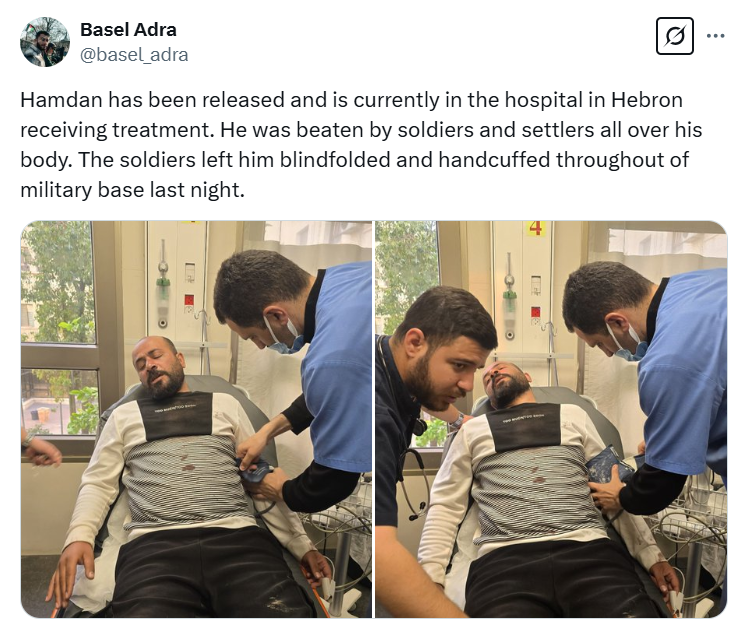
And this is to say nothing of the developments around the war in Gaza. The day I saw No Other Land, Columbia University student activist Mahmoud Khalil was abducted by Immigration and Customs Enforcement in front of his pregnant wife to be deported, outside ICE's authority and without any due process. This was part of a larger American constitutional crisis that also involves President Donald Trump unilaterally cutting $400 million of funding for Columbia and using the threat of further cuts to impose ideological control of the school. Just days ago another graduate student was kidnapped by ICE, this time outside Tufts University. Israel broke the ceasefire with Hamas with a series of airstrikes that killed over 400 Palestinians during the month of Ramadan, Palestinians demonstrated against the war and Hamas, and most ludicrously of all Disney blamed Snow White's box office flailing on star Rachel Zegler's outspoken support for Palestine and not because, you know, the movie is piss.[6] It's inaccurate so say No Other Land has been talked about more than seen; we see it every day.
Conclusion: There Is No Alternative
Taken together, the three films—Northwest Passage, The Zone of Interest, and No Other Land—span the development of settler movements and the shifting in public attitudes: pioneer expansion and domination as entertainment, as historical crime, as contested political issue and community hardship. As Americans, these continue to be relevant: not just in how our very land can be used to advance colonial logic, as in the filming of Northwest Passage in McCall, but in how American support for Israel, in part to assuage its guilty conscience for turning away Jewish refugees from Germany during the Holocaust, has led to the grotesque spectacle of bipartisan support for a campaign of ethnic cleansing in the name of antisemitism, carried out by actual Nazis.
The way forward is found not in the movies themselves, but in the spirit of collaboration that informs the best of them. In Jonathan Glazer's elevation of Aleksandra Kołodziejczyk, and especially the Israeli-Palestinian cooperative effort that went into No Other Land. Basel Adra and Yuval Abraham's Oscar speech underlines this: no one is protected, unless all are protected. These are grim times, with a policy of unchecked brutality used as grist for social media content, a vulgar display of power.
Fascism is nothing but power, the pursuit and worship of it in its most brute, zero-sum form, but it derives that power from fear alone and so is ultimately weak. Enduring strength comes from the bonds between people, especially when their backgrounds are so different that solidarity should be impossible. It is not easy and should never be taken for granted, but united action is greater than the sum of its parts. Out of many, one; out of zones of interest, mutual benefit. No other way.
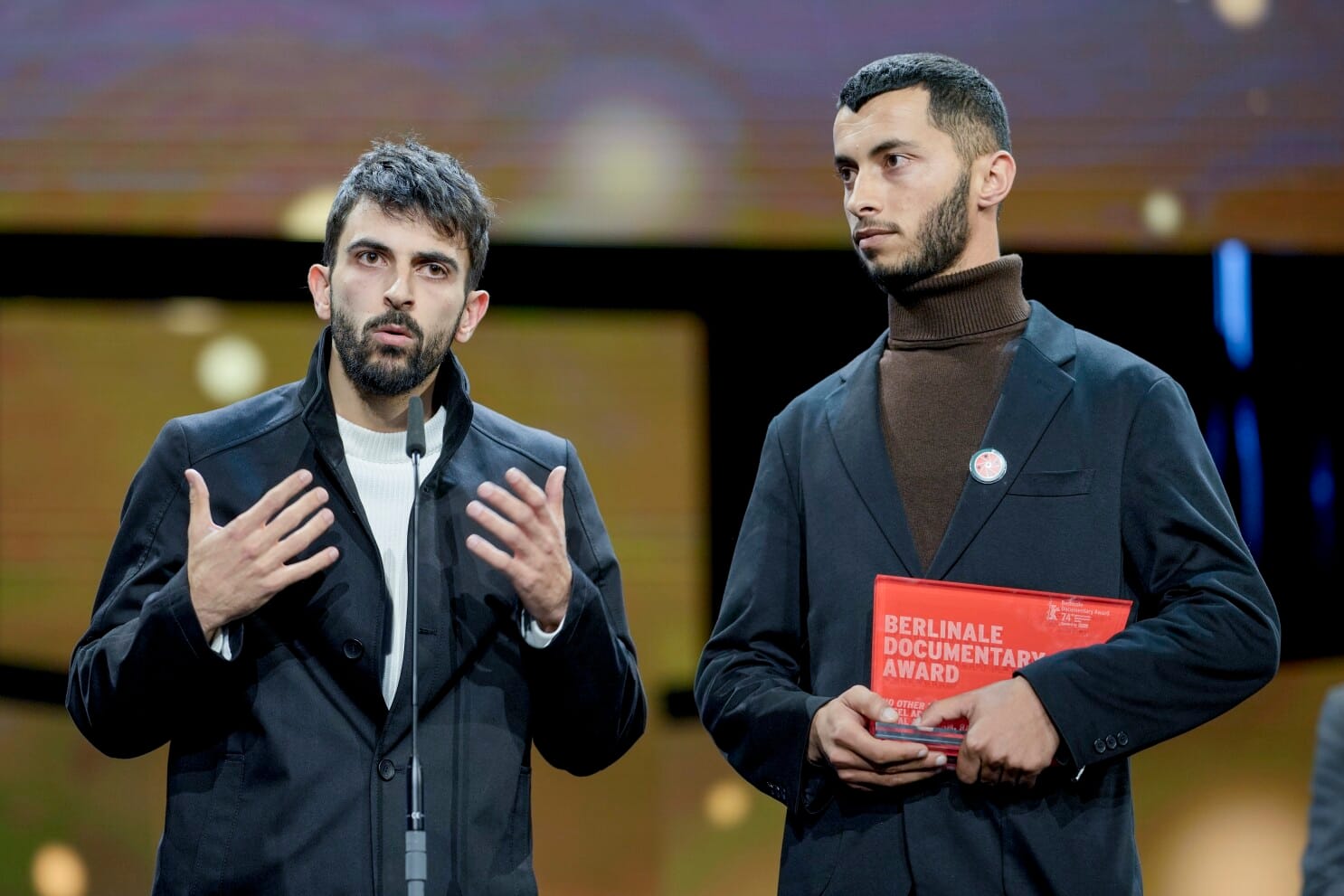
According to this contemporary account of the film shoot, the scenes of soldiers wading through the marsh were shot in lower Payette Lake. St. Francis was built along a ten-acre stretch of the Payette River, and the human chain sequence filmed along a higher stretch with more active rapids. The Crown Point fortress is described as being built "on a penninsula jutting out into Payette Lake," which almost certainly refers to the mass that comprises Ponderosa State Park and terminates with the Narrows Overlook.
↩︎Interestingly, Rogers himself would go on to write a drama about rebellious Odawa chieftain Ponteach (Pontiac) that was largely sympathetic.
↩︎It wouldn't be until 2009's Inglourious Basterds that an explicit connection between the Western and War Film genres would be made, though as with Northwest Passage this has more to do with genre classification than historical analysis.
↩︎Unmentioned in the script but forming important context is that Rudolf and Greta first met as members of the Artaman League, a blood-and-soil agrarian movement.
↩︎It goes without saying that Hamas is a murderous organization that finds its people most useful when they are dead, but it exists downstream of the Israeli government's control over Gaza. It is not itself a sovereign polity, anymore than the Irish Republican Army. I agree with many who say Palestinians would be better off without them, but Benjamin Netanyahu would seem to disagree.
↩︎The new Snow White is, no joke, going to be the basis of the next newsletter. After thousands of words about fire and ash and rubble I desperately need a palette cleaner, and [piss it is](https://cinema-purgatorio.ghost.io/snow-white-and-the-seven-adaptations/).
↩︎
Enjoyed the read? Subscribe for free and get the next one as soon as it's published! If you know someone who would enjoy it, share the link. And if you want to support Cinema Purgatorio, any tips I receive will help to offset hosting costs. Any support is appreciated.
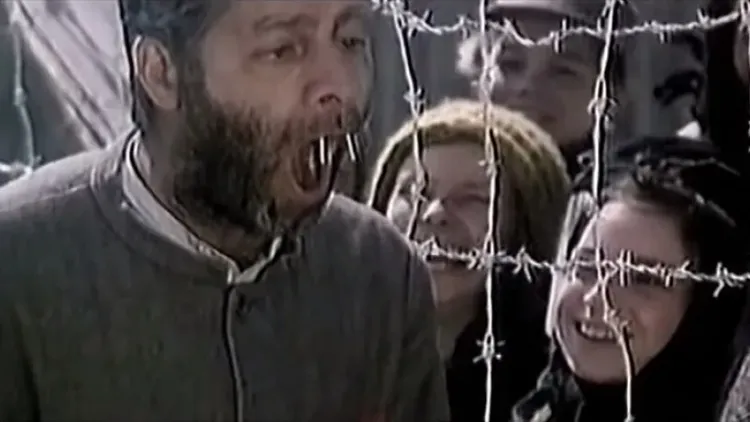
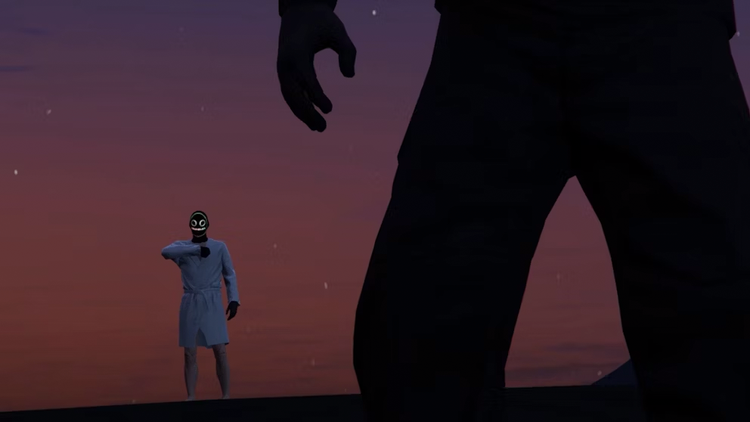
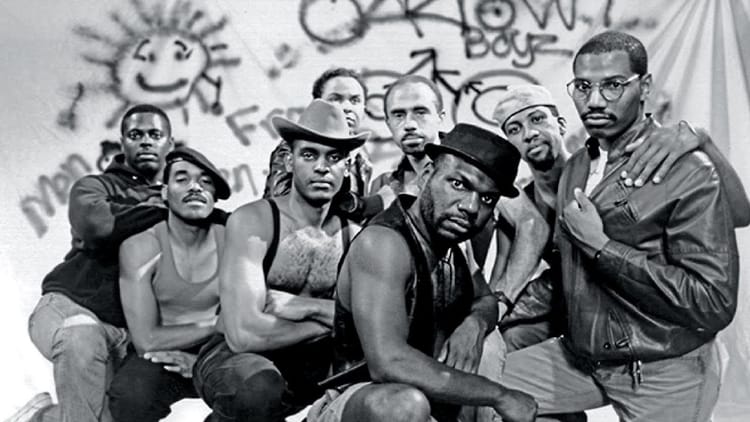
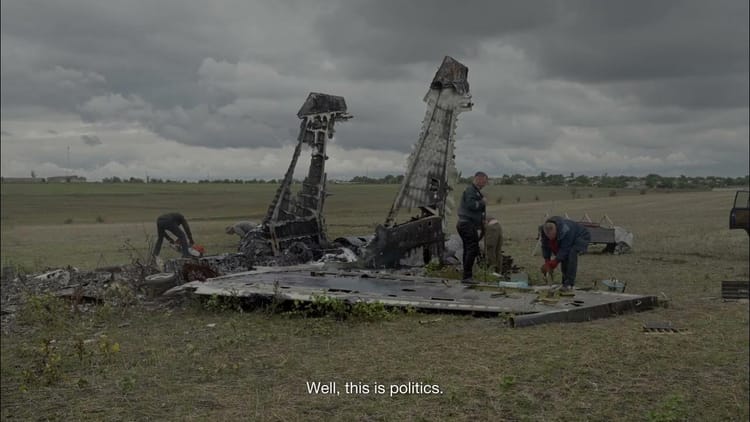

Member discussion